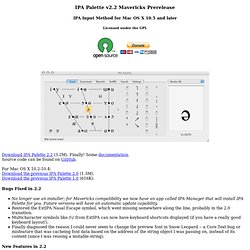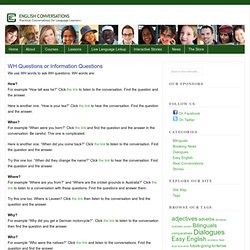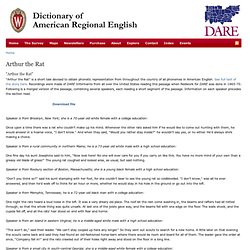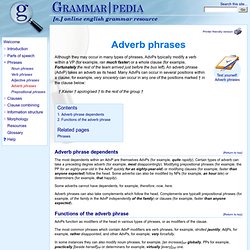

IPA Palette. IPA Palette v2.2 Mavericks Prerelease IPA Input Method for Mac OS X 10.5 and later Licensed under the GPL Download IPA Palette 2.2 (3.2M).

Finally! Some documentation. For Mac OS X 10.2-10.4:Download the previous IPA Palette 2.0 (1.3M).Download the previous IPA Palette 1.0 (616K). Bugs Fixed in 2.2 No longer use an installer; for Mavericks compatibility we now have an app called IPA Manager that will install IPA Palette for you. New Features in 2.2 You can click in an unoccupied part of an image map (a part that has no IPA symbol and thus doesn't hilite under your mouse) and drag it out into a new mini-palette (I call them "auxiliaries"). Bugs and Potential Problems IPA Manager is not fully localized in this prerelease version.The PDF icon used in Snow Leopard and later doesn't hilite (invert to white on black) correctly in the International menu, although it does in the Pref Pane.
What Folks Are Saying. Sound - British Cockney London Accent Phrases #1-43. WH Questions or Information Questions. We use WH words to ask WH questions.

WH words are: How? For example “How tall was he?” Click the link to listen to the conversation. Find the question and the answer. Here is another one. When? Here is another one. Try this one too. Where? Try this one too. Why? Who? Which? AMEPinTASSIE - CSWE 3 Pronunciation. American English Pronunciation Lesson: Wh- question Pitch Boundaries.
Introduction to wh-questions A wh-question begins with the words who, what, why, when, where, and how.

These types of questions seek information and cannot be answered with "yes" or "no. " Wh-questions can end with a rising or falling pitch boundary, depending on whether the speaker is truly asking a question, or is masking a suggestion as a question. Rising pitch boundary in wh-question When the speaker holds no assumption as to what the answer will be, and the topic is new, the wh-question is likely to have a rising pitch boundary. Analysis: The rising pitch of this question tells the listener that this is a true question (the speaker does not have any idea of what the answer may be) of a new topic to the conversation.
Sound - British Cockney London Accent Phrases #1-43. IDEA International Dialects of English Archive IDEA International Dialects of English Archive. Both as a courtesy and to comply with copyright law, please remember to credit IDEA for direct or indirect use of samples.

IDEA is a free resource; please consider supporting us. Audio Player. IDEA International Dialects of English Archive IDEA International Dialects of English Archive. Both as a courtesy and to comply with copyright law, please remember to credit IDEA for direct or indirect use of samples.

IDEA is a free resource; please consider supporting us. PLACE OF BIRTH: Wittmann, Arizona GENDER: male ETHNICITY: Latino/Chicano OCCUPATION: student EDUCATION: Subject was a university student when recording was made. Speech Accent Archive. IDEA International Dialects of English Archive IDEA International Dialects of English Archive. Dictionary of American Regional English. "Arthur the Rat" "Arthur the Rat" is a short tale devised to obtain phonetic representation from throughout the country of all phonemes in American English.

See full text of the story here. Recordings were made of DARE Informants from all over the United States reading this passage when fieldwork for DARE was done in 1965-70. Following is a merged version of the passage, combining several speakers, each reading a short segment of the passage. Information on each speaker precedes the section read. Download file Speaker is from Brooklyn, New York; she is a 70-year old white female with a college education: Once upon a time there was a rat who couldn't make up his mind. Speaker is from a rural community in northern Maine; he is a 73-year old white male with a high school education: One fine day his aunt Josephine said to him, "Now look here! Sounds of English. IPA Charts. Grammarpedia - Adverb phrases. Although they may occur in many types of phrases, AdvPs typically modify a verb within a VP (for example, ran much faster) or a whole clause (for example, Fortunately the rest of the team arrived just before the bus left).

An adverb phrase (AdvP) takes an adverb as its head. Many AdvPs can occur in several positions within a clause; for example, very sincerely can occur in any one of the positions marked † in the clause below: † Xavier † apologised † to the rest of the group † Adverb phrase dependents The most dependents within an AdvP are themselves AdvPs (for example, quite rapidly). Some adverbs cannot have dependents, for example, therefore, now, here. Adverb phrases can also take complements which follow the head. Functions of the adverb phrase AdvPs function as modifiers of the head in various types of phrases, or as modifiers of the clause. Many AdvPs can modify whole clauses, for example, Most surprisingly everybody completed the course.